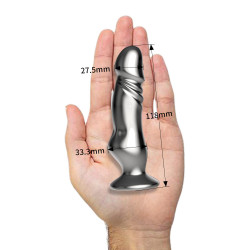
How to Make a BDSM Contract
Regardless of your level of experience with BDSM, we will walk you through the process and offer a helpful template for you to utilize.
Knowing precisely what is expected of you in any love connection is helpful. This is particularly true if you're in a D/s relationship because failing to establish safe, mutually agreeable limits before you end the relationship could jeopardize your physical and mental health.
Always have an open discussion beforehand about the intricacies of BDSM play, with equal participation from all participants (yes, including you, submissives!). Many people feel that using a BDSM contract to put their exploration of their boundaries, wants, and beyond into writing is beneficial while they are in the negotiating phase.
This may be as formal as the product from the conference room scene in "Fifty Shades of Grey," or it could be as basic as a few sentences in a shared iPhone message. Each BDSM contract's parameters will be established based on your preferences and what you require to maximize the power dynamics in your partnership.
Download Our BDSM Contract Template
However, where do I begin? Why not right here? We've created a downloadable, editable form to help you define the parameters of your dream D/s partnership. Keep in mind that you are the only one with the ability to develop your erotic enjoyment. Please make the most of this template, or use it to discuss boundaries and desires with your play partner.
What do you need to know about BDSM contracts?
Although the kink community has been using BDSM contracts for decades, they didn't get widespread recognition until the release of "Fifty Shades of Grey." The most successful BDSM contracts will come from more official conversations than your typical pillow talk, but you don't have to sit across from each other in a glass-panelled conference room and wear a business formal dress when you have a chat. You're not getting into the specifics of what can make a D/s partnership so stimulating if you're just jokingly sharing what you enjoy and don't like in bed. Therefore, don't be scared to start the conversation in a manner that may seem formal to you.
"Both novices and seasoned practitioners can benefit from having a contract," Alana Ogilvie, MS, LMFT, tells Kinkly. "Contracts can help all parties understand each other's limits and boundaries, as well as set expectations for scenes and the connection between the parties. The kink community places a high value on the concepts of "safe, sane, consensual," and a contract can assist in guaranteeing that play stays true to these standards.
A contract will clarify your objectives, whether you're trying bondage or Total Power Exchange (TPE), which Ogilvie claims will "result in more communication and lessened conflict." Remember to let the submissive take the lead in discussions when in doubt. Although both couples benefit equally from this contract, the submissive should be given the authority to play a significant or active role in its contents to ensure their boundaries are understood.
Essentials To Include When Writing a BDSM Contract
Even if you decide to omit some of the addenda from our form, you still need to make sure your agreement contains the following eight components:
The duration of the contract. It's critical to realize that either party may end the agreement whenever they see fit without incurring any penalties. It will be helpful in planning, establishing a clear commitment between partners, and defining expectations. Therefore, you should provide the beginning and ending dates of your agreement. Additionally, it gives a specific date for all parties to present renegotiation points.
What will you call each other during a scene? Clearly defining who participates, their job for the contract term, and how each party will be addressed should be your priority. You are free to experiment with different titles, such as "master" and "pet," "daddy" and "princess," and more.
Physical and emotional implications that might be relevant to play. By including a health statement in your contract, both parties can reveal any physical or emotional limitations that could change a situation. Although this may seem like a mood enhancer, you must agree with sexually transmitted diseases (STDs) if bodily fluids are shared, allergies if you intend to serve whipped cream and chocolate sauce, or emotional triggers if any parties are under duress or are recovering from a traumatic event.
Expectations that go beyond the sexual. Although it's simple to imagine a master/sub relationship that involves frequent spanking and oral service, a contract can also help figure out how your relationship develops outside of the bedroom. As the submissive goes about their regularly planned programming, will they be sporting a pendant or bracelet to represent their ownership? When they enter the house, would they be expected to undress immediately? Or will the dominant and submissive revert to equality after the scene? When completing your contract's "roles and expectations" section, you should respond to these questions collectively.
Hard and soft limits for all parties. To make sure that no one's boundaries are broken if things get heated, it's safe to state your "hard limits," or your non-negotiables, upfront. Although the dominant might seem more likely to blur boundaries before the submissive, this also applies to the dominant. Everyone should have an equal voice when expressing what they would like to explore and what they would prefer to avoid altogether.
Safewords. To establish clear limits and guarantee that comfort levels are preserved throughout the play, it is essential to have a pre-established term, phrase, or signal that halts or slows play. Your safety words can be any term or signal that seems appropriate to you and your play partner, even though many dominants and submissives use the stoplight system ("red" to stop, "yellow" to go cautiously).
Agreed upon violations (and subsequently, punishments). How each transgression is weighted depends mainly on your particular circumstances. A verbal warning may be given to some couples for failing to address the dominant by their correct term of address, while impact play may be necessary for others. Utilize your contract to determine the relative importance of your rules and appropriately assign penalties. It's important to remember that not all BDSM practitioners find the concept of punishment appealing, so if it doesn't feel right for you, don't include it in your contract. (Read 10 BDSM Punishments That Segue Perfectly Into Sex for some inspiration.)
Aftercare, aftercare, aftercare. From cuddling to offering water or snacks to engaging in gentle conversation, aligning on aftercare needs can't be understated. Spelling this in your contract is a great way to ensure everyone's desires are heard.
BDSM Contract Dos and Don'ts
Although there is no right or wrong way to colour your contract, the following recommendations may help you form your opinion if you have any questions, worries, or concerns:
- Don't overly restrict yourself or your partner. Anyone may become a small lawyer by using a ballpoint pen to outline the details of their sexual life but avoid the trap of becoming so preoccupied with your contract that you lose the fun. While it's important to list everything you wouldn't do, some couples discover that leaving everything they would do open-ended allows them to be more creative. If a rule is added, altered, or removed, you don't want to put yourself in a scenario where you must modify your contract to the letter. Instead, concentrate on your dynamic's wider range and the overarching ideas that you believe are crucial to your particular duties.
- DON'T consider the contract binding. Keep in mind that contracts are intended to be renegotiated. " Needs change, circumstances change, and your contract should change with you as a person!" "Ogilvie says."
- Don't feel counted out if you practice polyamory. Although Kinkly's design has room for one dominant and one submissive, if that's a feature of your relationship dynamic, we invite you to customize it by including more participants.
DO set the tone for negotiations. Ogilvie advises addressing the concept of drafting a contract with your spouse with clarity and conciseness. " We need to get down and work this out immediately," you don't have to say. However, ensuring everyone is in the right frame to begin negotiating the contract details will guarantee that it accurately reflects your desire." Before you start eating, may we suggest putting on silky clothes and lighting a candle?
DO think about looping in an accountability partner. While it is crucial to preserve the co-signers confidence to keep the contract's specifics confidential, sharing your decisions with a third-party "accountability partner" can help ensure everyone's safety. The play area can feel error-proof if you share the specifics of your agreement with someone who can assist in holding the dominant accountable for their conduct, whether that person is a trusted friend, therapist, or mentor.
DO keep it fun. The foundation of an erotic power exchange is ultimately having fun and appreciating your partner or partners, so remember to have a little fun. Consider turning it into a date. Ogilvie advises that you don't contract at the start of a scene or as part of establishing a formal partnership. Make supper, pour yourself a beautiful glass of wine, and discuss what you would like or don't want to include in your contract. Preparing a formal document does not necessarily need to be stuffy and professional just because you create one.
I've filled out my BDSM contract - now what?
Firstly, congratulations. A vital step toward a satisfying D/s relationship that is also safe, sane, and consent has been taken by you. After you've made sure everything is in order, store the contract in a location that all parties can access in case it needs to be referred to again. You can print this off, keep it on the bedside table, or store it on a shared disk. Remember that, like your relationship, your contract is flexible and susceptible to change; it is not legally binding. Please keep it in a secure location that is always accessible for editing.
You won't have to pull out your contract each time you're ready to go to bed from now on. However, remember that you may always go back to the fundamental principles of your partnership, including the reason you wrote the contract in the first place, if a term of your agreement is broken or violated, especially if it undermines your trust.















































